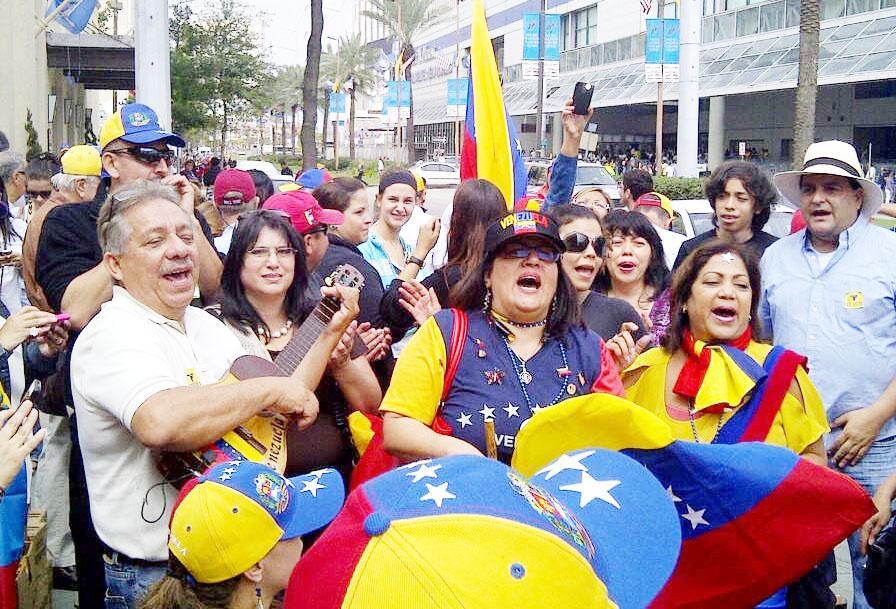Mara Perez stood in line for 6 hours to cast a vote that took 30 seconds.
Like thousands of other Venezuelan citizens living in the southern US, Perez endured an hours-long period of waiting to vote in the Venezuelan presidential election on Oct. 7 at the convention center in New Orleans. Student volunteers were on-hand to ease the process.
The election was between Hugo Chavez, who’s been in president in Venezuela since 1999, and Henrique Capriles Radonski. It was announced on Sunday night that Chavez was re-elected for another six-year term as president of Venezuela with 54.4 percent of the vote.
In past Venezuelan elections, the Venezuelan consulate in
Miami was the voting station for Venezuelans who live in Florida, Georgia, North Carolina and South Carolina, according to the Times-Picayune. In January 2012, Venezuela shut down the consulate in Miami because the US state department suspected the consul of conspiring against America, according to the Times- Picayune.
Because the next nearest consulate is in New Orleans, Venezuelan authorities instructed voters to make arrangements to vote in the city instead of in Miami for this Oct. 7 election.
The New Orleans consulate typically is the voting place of Venezuelans living in Alabama, Louisiana, Mississippi, Missouri and Tennessee, but for Perez, the trip took an 18-hour bus ride from Miami.
Areanne Briceno, volunteer at the elections, said she felt Chavez
closed down the embassy in Miami prior to the election for his own reasons. “Chavez knew people would be less likely to vote if they couldn’t afford to travel to New Orleans to vote,” Briceno said.
Though she traveled on a chartered bus without anyone she knew, Perez said she felt comfortable being with these new people. “It’s like a hippie community with us Venezuelans. Everybody here is generally nice. We all have the feeling that we’re doing something good,” Perez said.
Four buses, including the bus she was on, arrived in New Orleans on Friday. According to Perez, 22 more buses carried Venezuelan citizens to the election in New Orleans and arrived on Saturday.
Perez said she felt it important that she make this trip to New Orleans to vote for a few reasons. “It’s your right to vote. Chavez told us we wouldn’t be able to vote. We knew it’d be difficult, but we decided it wasn’t his decision. It was ours,” Perez said.
Of the approximate 20,000 Venezuelan citizens living in
Miami, Briceno said about 6,000 were able to come to the elections in New Orleaans from Miami. Approximately another 2,000 Venezuelan citizens from the southern US voted at the convention center, according to the Times-Picayune.
Briceno said the outcome she and many of those voting in the elections hoped for was for Capriles, simply because he opposed Chavez. “We’re tired of this dictator. He violates our rights. And this election is our last hope,” Briceno said.
Briceno and her family came to the US in 2000 after her parents found jobs in the country. “We left because Chavez was in power,” Briceno said.
Seeing a need, some Loyola students decided to help out in the election.
Economics sophomore Pedro Benitez said he and seven other people from Loyola volunteered at the election on Sunday. Benitez said the group from Loyola arrived at9a.m.andleftat2p.m.Hesaid he expected to see about 10,000 people vote on Sunday.
Benitez said the way a group of Loyola students got involved started with Martin Quintero. Quintero, political science junior, served as a legal witness inside the elections. Benitez said Quintero is Venezuelan and worked with Voto Joven, an organization that encourages young people to vote and was present at the election, to sponsor an informational session led by LUCAP regarding getting
involved with the election.
Benitez said the Loyola students were there to do whatever help was needed, like handing out sandwiches to those waiting to vote. “We’re not here because of political parties. We’re just here to help because we want this process to be as smooth and comfortable for the people who are voting today as possible,” Benitez said.
Though she and other Venezuelan citizens traveled and waited for hours to get to this election, Briceno said braving the extreme hours are nothing compared to what could be if Chavez lost. “We don’t mind being here if it means there will be change,” Briceno said on the day of the elections.
Aaren Gordon can be reached at afgordon@loyno.edu








